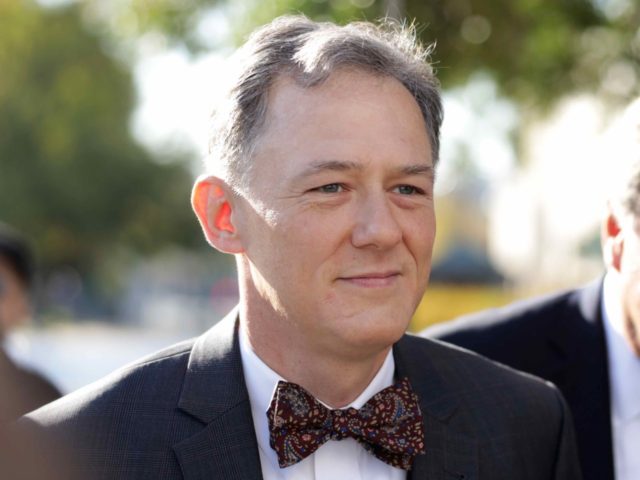The second witness in the first public “impeachment inquiry” hearing to be called to testify Wednesday by House Intelligence Committee chair Rep. Adam Schiff (D-CA) will be George Kent, Deputy Assistant Secretary in the European and Eurasian Bureau at the State Department.
Kent already testified once, on October 15 — behind closed doors and long before an “impeachment inquiry” was authorized. The transcript was only recently released.
Democrats are making Kent one of their two leadoff witnesses because for two reasons. First, he comes across as a likable curmudgeon: while he has sharp criticism for President Donald Trump, he also has a quick wit. Second, he has many negative things to say about the role of former New York City mayor Rudy Giuliani, acting as President Trump’s personal lawyer and also as a player in U.S.-Ukrainian relations. Democrats will use Kent’s testimony to lay the foundation for an attack on Giuliani that they hope will paint the president in the worst possible light as well.
(Giuliani also published an op-ed on Tuesday evening in the Wall Street Journal, which will appear in print on Wednesday: “My client’s call with the Ukrainian president was innocent, and the House inquiry is a travesty.”)
Key Democratic Talking Points
1. Kent will testify that he believes that Giuliani, through dubious sources in Ukraine, was part of a “campaign of slander” that led to President firing Ambassador Marie Yovanovitch. One of the key articles in the campaign was published by John Solomon in The Hill, in which former Ukrainian Prosecutor General Yuriy Lutsenko claimed that Yovanovitch had given him a “do not prosecute” list. She was alleged to be anti-Trump. She denies all of the claims.
- What Democrats aren’t telling you: Yovanovitch may be the innocent victim of a campaign of slander. However, new Ukrainian President Volodymyr Zelensky told Trump in their phone call that he also thought she was “bad.” He said: “I agree with you 100%. Her attitude towards me was far from the best as she admired the previous President and she was on his side. She would not accept me as a new President well enough.” All ambassadors serve at the pleasure of the president; there was nothing illegal in her dismissal.
2. In their summary of Kent’s testimony, Democrats claim: “With respect to President Trump’s request that Ukraine investigate former Vice President Biden, Mr. Kent stated: ‘I do not believe the U.S. should ask other countries to engage in politically associated investigations and prosecutions.'” He also said that Trump’s actions were wrong.
- What Democrats aren’t telling you: Kent only learned about the request because the president released the transcript. He also had no firsthand knowledge of any connection between aid and investigations. Asked by Rep. Lee Zeldin (R-NY), “Do you have any firsthand knowledge of United States aid to Ukraine ever being connected to the opening of a new investigation?”, Kent answered: “I do not have direct knowledge, no.”
3. Kent told the closed-door hearing that he had heard from Ambassador to the E.U. Gordon Sondland that “POTUS wanted nothing less than President Zelensky to go to microphone and say investigations, Biden, and Clinton.”
- What Democrats aren’t telling you: Kent himself expressed misgivings about Hunter Biden serving on the board of Burisma, a company associated with Ukrainian corruption. He testified that in 2015, “I raised my concerns [with the vice president’s staff] that I had heard that Hunter Biden was on the board of a company owned by somebody that the U.S. Government had spent money trying to get tens of milljons of dollars back and that could create the perception of a conflict of interest.” He was told that then-Vice President Joe Biden could not be reached to deal with the problem because Biden’s other son, Beau, was dying of cancer. Hunter continued on the board, even though, Kent said, there were concerns in the State Department about Burisma.
Another key point: Kent testified the U.S. has made aid to Ukraine conditional on reform in the past. For example, the U.S. made sovereign loan guarantees from 2014-2016 conditional on reform in the Ukrainian prosecution services. Asked whether he thought former Vice President Biden had used a “quid pro quo” in his now-infamous threat to withhold $1 billion in U.S. aid unless Ukraine fired its chief prosecutor, Kent said he preferred the term “conditionality for assistance,” saying that governments use it, as well as the International Monetary Fund (IMF).
Joel B. Pollak is Senior Editor-at-Large at Breitbart News. He earned an A.B. in Social Studies and Environmental Science and Public Policy from Harvard College, and a J.D. from Harvard Law School. He is a winner of the 2018 Robert Novak Journalism Alumni Fellowship. He is also the co-author of How Trump Won: The Inside Story of a Revolution, which is available from Regnery. Follow him on Twitter at @joelpollak.
Kristina Wong contributed to this article.

COMMENTS
Please let us know if you're having issues with commenting.